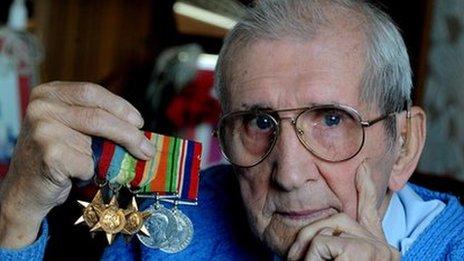Russia battles to honour UK's WW2 naval veterans
- Published
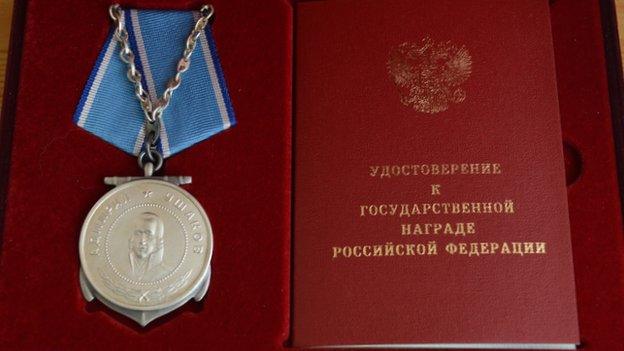
The Ushakov Medal is one of the highest military honours for Russian naval personnel and is named after Fyodor Ushakov, one of the founders of the Black Sea Fleet
World War Two veterans have waited 70 years to hold a foreign medal they earned in freezing waters plagued with enemy ships. As a result some are dying weeks before their day to be awarded the Ushakov Medal arrives, prompting a Russian Embassy team to race around the UK to honour as many Arctic convoy mariners as possible.
Harold Turtle describes the Ushakov Medal - one of Russia's highest honours for naval personnel - as "the most beautiful medal I have ever seen".
The Arctic convoys veteran has waited seven decades to hold the silver medal and its red velvet case.
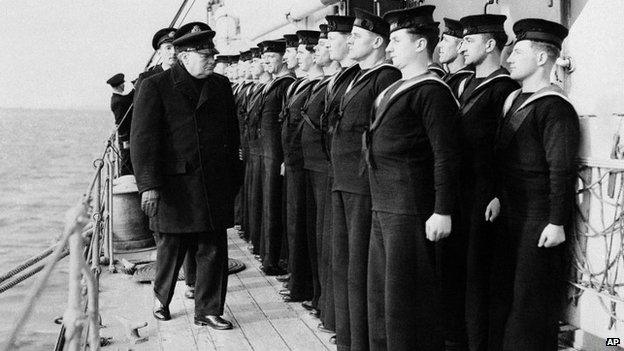
Winston Churchill described the Arctic Convoys as "the worst journey in the world"
Mr Turtle, who lives in Newcastle-upon-Tyne but is originally from the Isle of Wight, said: "It was well worth the wait."
The Russian Embassy team who presented him with the medal is more than half way through a journey to visit 3,303 people in his position.

What were the Arctic convoys?
After Germany invaded the Soviet Union on 22 June 1941, Soviet leader Stalin demanded help and the western Allies provided supplies.
The most direct route was by sea, around northern Norway to the Soviet ports of Murmansk and Arkhangelsk.
The route was very dangerous, especially in winter when the ice spread further south.
Many of the convoys were attacked by German submarines, aircraft and warships.
Conditions were among the worst faced by any Allied sailors. Over four million tons of supplies were delivered to the Russians.
Source: Imperial War Museum, external

The team includes Cdr Igor Elkin, who travelled to the Isle of Wight in February to honour Len Simmonds, veteran of HMS Berwick.
Mr Simmonds though had died just weeks earlier.
His widow Pauline received the medal on his behalf and said: "I was very proud of him and the medal was absolutely beautiful. He had died a month before they came, so I was emotional when receiving it.
"They told me when they were coming but I had to say I am afraid he has passed away.
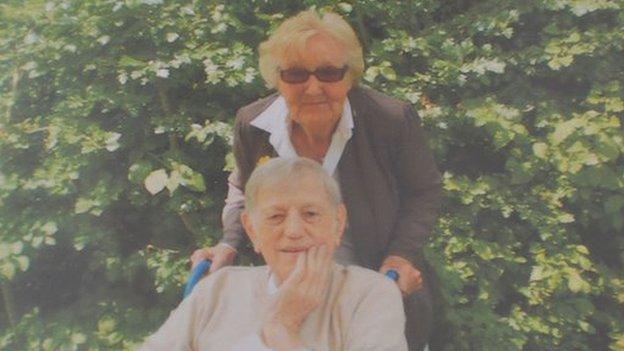
Pauline Simmonds said her husband Len rarely talked about his experiences on the Arctic convoys and she was honoured to receive the medal on his behalf
"It was very touching. I thought what a shame he didn't see it."
More than 3,000 sailors and merchant seamen lost their lives on the convoys to deliver essential supplies and military hardware to the Soviet Union.
Between August 1941 and 1945, a total of 78 convoys travelled to and from northern Russia.
They took four million tonnes of supplies, external, used by Soviet forces fighting against Germany, including more than 7,000 planes and 5,000 tanks.
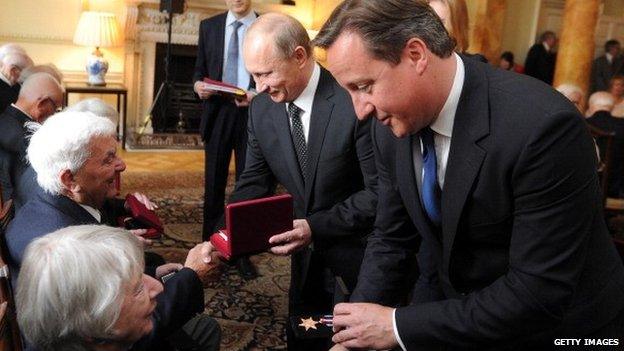
Vladimir Putin and David Cameron held a joint event in June 2013 in London, to present veterans with the Ushakov Medal and Arctic Star medals
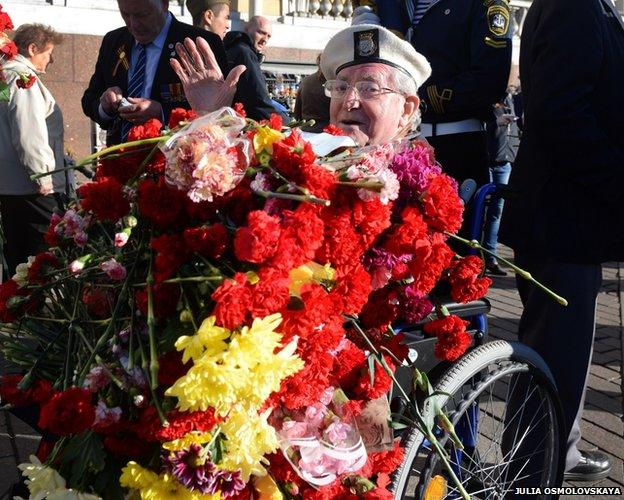
Russia holds veterans of the Arctic Convoys in high esteem, as Harold O'Neil, 93, of Edinburgh found out in the Victory Day parade in St Petersburg, on 9 May
Before 2013, UK veterans of the Arctic convoys though were awarded the Atlantic Star by the British Government, which had consistently refused Russian requests for them to get the Ushakov honour.
However Cdr Eddie Grenfell, who served on four of the treacherous convoys, refused to accept this and waged a long campaign for a specific medal for Arctic convoy veterans.
After many years of bureaucratic wrangling the government agreed and the Arctic Star was forged.
And eventually David Cameron relented over the Ushakov medal and agreed veterans should be awarded both.
Mr Grenfell, from Portsmouth, died in June 2013 aged 93, just over three months after he was presented with the Arctic Star.
Just days before he died, Vladimir Putin visited Downing Street to award the first veterans with the Ushakov medal.
"It's hard to imagine that under the severe Arctic conditions of frosts and storms, of waves reaching sometimes five to seven metres of height, every now and then armless Arctic convoys moved along the route and reached their final destination," Mr Putin said at the time.
"We remember you and we believe you are heroes, and I'm humbled by the honour to be here today and to decorate you, to see and to decorate you with this Ushakov medal."
Arctic Star medals were sent out to veterans in the post and most have now been distributed.
But the Russian authorities have made it their mission to hand out each one to veterans, as far as possible.
Elizaveta Vokorina, attaché of the Russian Embassy, has seen first hand the race against time they face.
She said: "Sadly, time is against them, as most of them are over 90.
"On one occasion we had to rush off to a hospital to present the medal to a very sick veteran.
"More often, we pass the award to the family, who are going to visit a veteran in hospital or care home."
Ms Vokorina said it was not clear how many veterans had died before the medal could be presented to them.
With the Ministry of Defence receiving nearly 1,500 applications for World War Two medals each year, their situation is just one example of veterans who face going to the grave without the award.
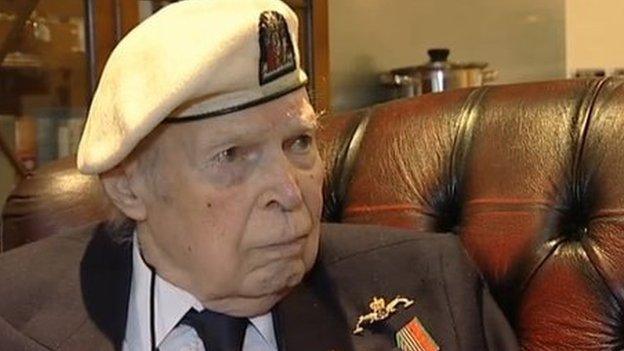
Cdr Eddie Grenfell campaigned for 16 years to get a designated medal for Arctic convoy veterans

How many other WWII medals are still being awarded and why?
The Ministry of Defence receives roughly 1,450 applications each year from veterans
450 are made by veterans over the age of 90, which are fast-tracked
4,500 are made by families of deceased veterans
13 medals and clasps from World War Two are still being awarded
Veterans of D-Day are now being awarded the Legion D'Honneur by the French government
Likely to be the last conflict with so many outstanding honours, as now the system is fully automated, rather than relying on veteran applications
Source: Ministry of Defence

Letters of gratitude for the Ushakov medal on the Russian Embassy website, external show the reality of honouring the men.
Irene Johnston collected the medal on behalf of her husband and wrote: "Sadly, my husband died unexpectedly in January. He did know he was to be presented with the medal.
"He would have been very proud I was able to accept it on his behalf."
Priscilla Bowers wrote: "I delivered the medal to my father, Frederick Victor Bashford, in hospital and he was thrilled that the Russian people had bestowed on him such an honour."
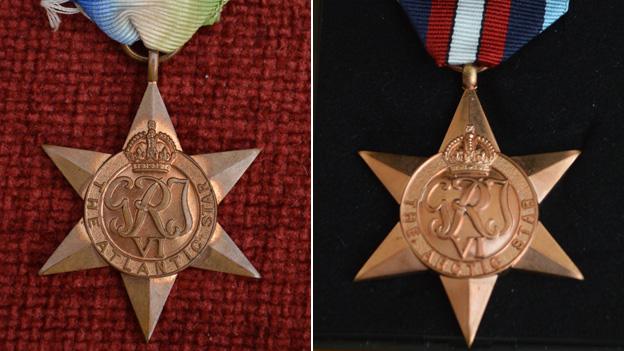
Veterans were originally entitled to the Atlantic Star (L) but after a lengthy campaign were also awarded the Arctic Star by the UK government
Paul Quinn, general secretary of the Royal Naval Association, said of the Russian medal: "I have anxious 93-year-olds on the phone saying 'I don't know if I will live until next week'.
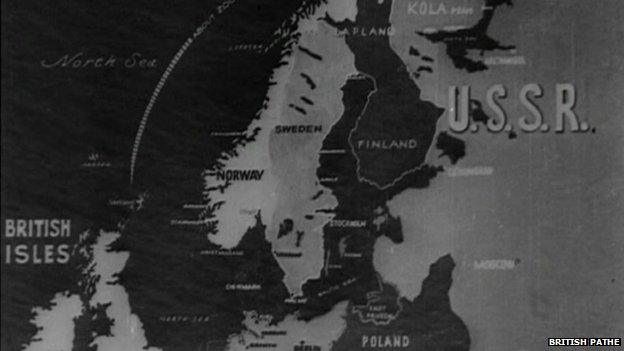
There were 78 convoys in total during World War Two with about 1,400 merchant ships delivering supplies to Russia
Family members of veterans have posted on a Facebook page, external saying they are fearful those in ill health will never get to hold the medal for which they waited so long.
Chris Wallace said: "I was very honoured to collect the Ushakov Medal for my father Herbert Wallace when they were being awarded in Cardiff as he wasn't well enough to attend.
"Sadly, he is now very ill in hospital fighting his last fight, it was a privilege to meet some of the survivors, those men are a special breed."
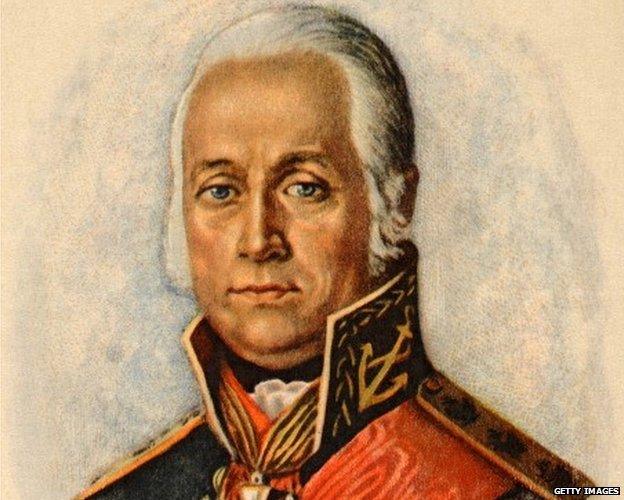
Admiral Fyodor Fyodorovich Ushakov (1743-1817) was commander of the Black Sea Fleet from 1790-1800
- Published11 July 2013
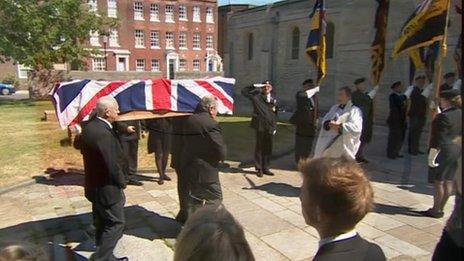
- Published20 December 2014
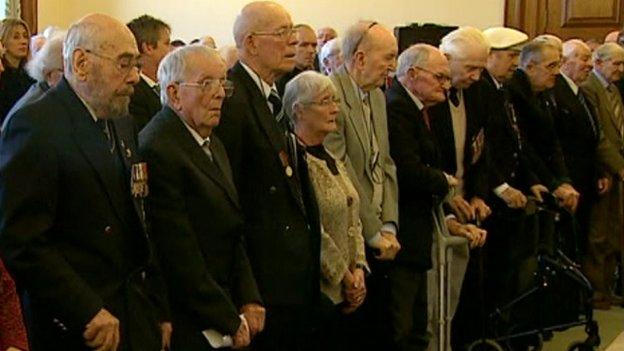
- Published3 December 2014
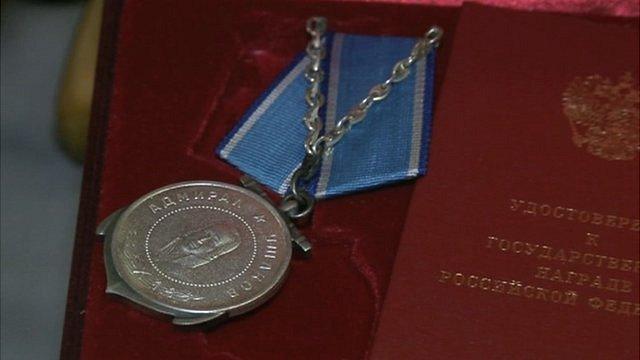
- Published7 November 2014
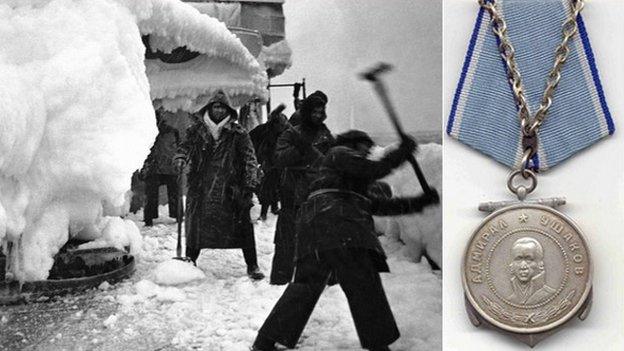
- Published31 October 2014
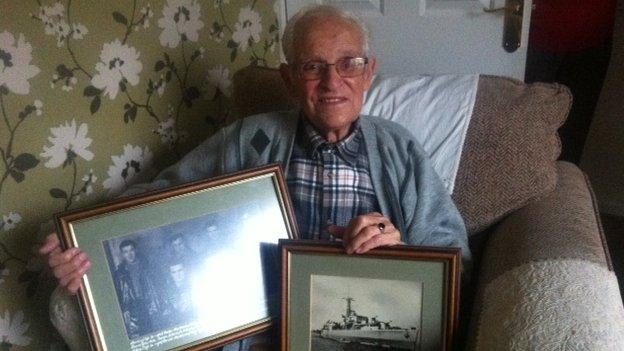
- Published18 June 2013
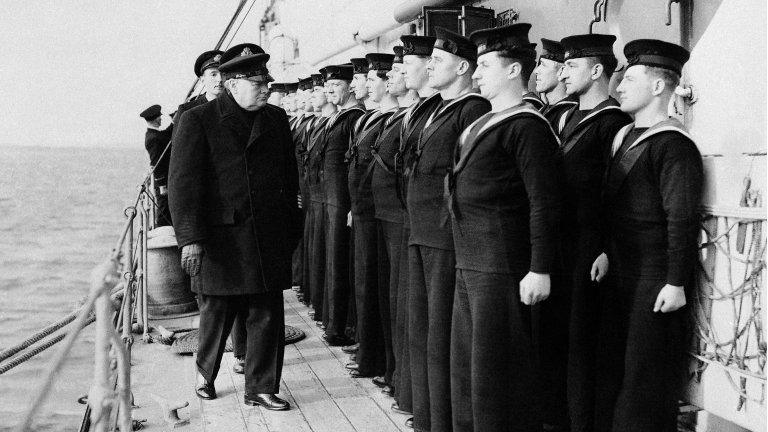
- Published3 June 2013
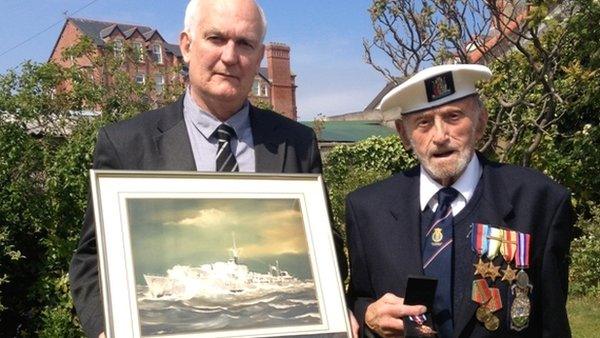
- Published14 January 2013
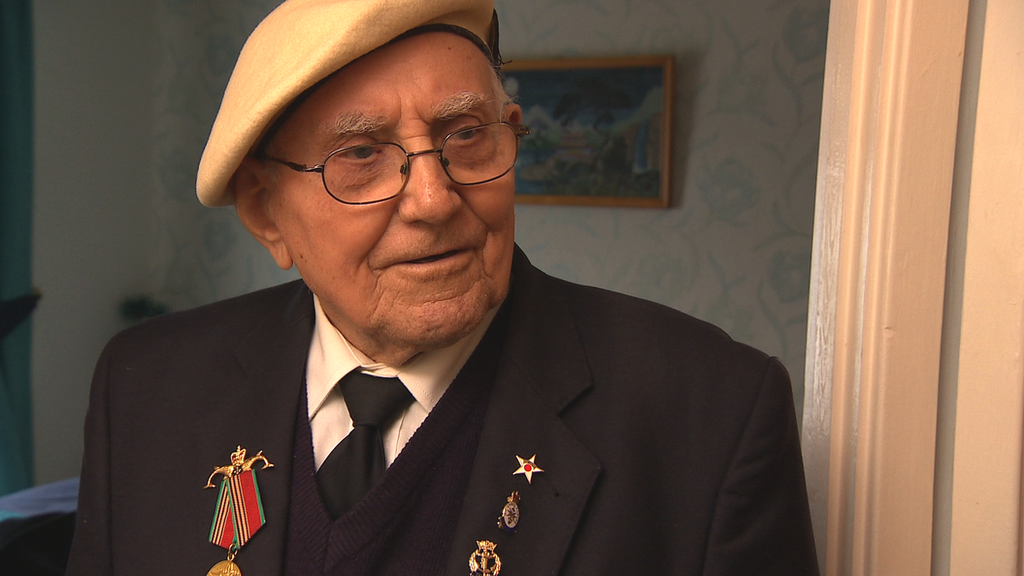
- Published3 October 2014
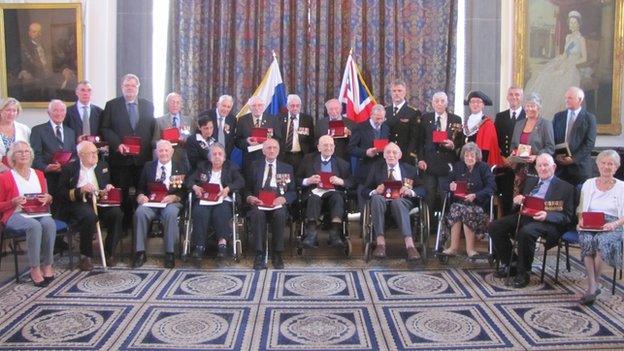
- Published12 January 2011
- Published7 September 2014
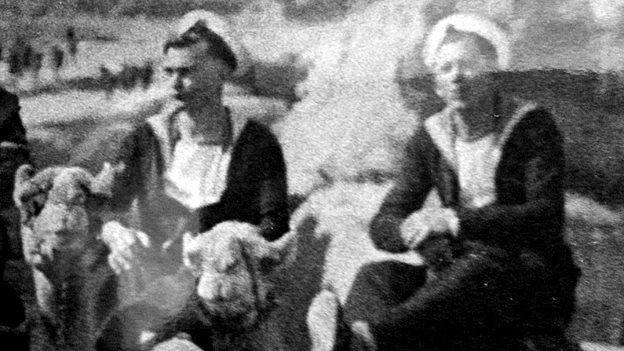
- Published31 October 2012
